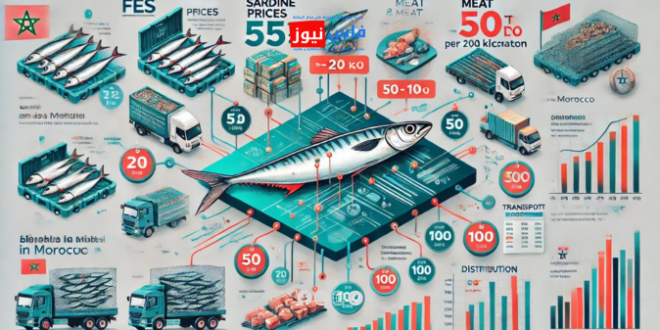In an extensive investigation conducted by Fez News, a significant controversy has emerged in Morocco’s commercial and social circles following the circulation of a video on social media showing a vendor offering sardines at just five dirhams per kilogram. This footage, which raised numerous questions about the real prices of fish and meat in Moroccan markets, prompted Fez News to delve deeper into the matter to uncover the full truth behind these claims.
The story began when a young man from Marrakech, Abdelilah, appeared in a video on TikTok, offering sardines at an unprecedented price in the Moroccan market. As the video spread like wildfire, opinions were divided between those who saw him as a hero exposing “price scams” and those who believed he was seeking fame and views at the expense of the truth. To ensure credibility, Fez News contacted several professionals and experts in the fishing and trade sectors and conducted field visits to various markets to verify the claims.
The Journey of Sardines from Sea to Consumer:
According to the Secretary-General of the National Union of Maritime Fishing, sardines are considered industrial fish, often directed to processing and export factories, where they are used to produce various derivatives such as canned goods and fish oil. Based on a professional agreement between fish industry owners and fishermen, the reference price for a kilogram of sardines was set at 3.80 dirhams in the southern regions extending from Agadir to Dakhla until 2024. However, last year, this price rose to 3.50 dirhams due to increased production and transportation costs.
In primary markets, known as “Halo” or “Marsa,” sardines are sold at three or three and a half dirhams. However, after adding transportation and refrigeration costs to maintain quality, the price in wholesale markets rises to around seven dirhams. At this stage, sardines are expected to be sold to retailers at eight dirhams, meaning the final price for consumers should not exceed ten dirhams per kilogram.
Price Disparities Between North and South:
In the northern markets, prices are determined differently, relying on an auction system known as “Dalala,” where prices are set based on supply and demand. Hamza Thami, Secretary-General of the Moroccan Confederation of Wholesale Fish Traders, explains that this system often leads to inflated prices due to speculation and the presence of numerous intermediaries. In this context, a box of sardines can sell for up to 200 dirhams, or about eight dirhams per kilogram, significantly raising prices in subsequent sales stages.
However, the bigger issue, according to professionals interviewed by Fez News, is that sardines pass through a long chain of intermediaries before reaching the final consumer. Between the fisherman and the retailer, agents, fish traders, and their representatives intervene, substantially increasing the price of sardines. This complexity in the distribution chain leads to sardines being sold to consumers at prices that sometimes exceed 15 to 20 dirhams per kilogram.
Accusations of Monopoly and Tax Evasion:
One of the most serious accusations uncovered by Fez News is the tax evasion practiced by some auction sellers. Fish is recorded in official ledgers at low prices that do not reflect the actual market value, enabling some parties to evade paying taxes on real profits. Some professionals point out that these sellers record sardines at prices ranging from two to three dirhams, while they are actually sold at much higher prices, explaining the significant price hikes encountered by traders when purchasing from ports.
Did Abdelilah Sell Sardines at a Loss?
Despite these complexities, several experts who spoke to Fez News agree that selling sardines at five dirhams per kilogram could be considered a loss-making practice. According to Moroccan commercial laws, selling at a loss is an illegal practice sometimes aimed at eliminating competitors from the market. Some traders, who chose to remain anonymous, suggested that Abdelilah might have used this strategy to attract attention and achieve high views on TikTok, potentially opening doors to advertising offers and gifts from companies.
Implications of Selling at a Loss on the Market:
Selling at unrealistic prices can create chaos in the markets, leading consumers to believe they are being exploited by other traders. This behavior also weakens trust between sellers and buyers and encourages the creation of a parallel market operating outside legal frameworks. Experts believe this situation requires urgent government intervention to regulate prices and enforce laws governing the market.
Proposed Solutions:
The Moroccan Confederation of Wholesale Fish Traders has proposed several solutions to regulate sardine prices, including the widespread use of standardized plastic crates that maintain fish quality and set allowable catch quantities for each fisherman. They also called for amending Law 1408 concerning wholesale fish sales and establishing a national registry for fish traders to identify individuals authorized to access wholesale markets, helping to curb speculation and monopolization.
Conclusion of the Investigation:
The investigation conducted by Fez News reveals a complex reality surrounding sardine prices in Moroccan markets. Between Abdelilah’s claims and the actual prices, a significant gap emerges, necessitating strict measures by the relevant authorities to regulate markets and prevent price manipulation. The investigation also highlights the need to enhance oversight of wholesale and primary markets and rigorously enforce laws to ensure transparency and protect consumers from exploitation.
Stay tuned to Fez News for more details and updates on this topic and other issues of interest to Moroccan citizens.
 فاس نيوز ميديا جريدة الكترونية جهوية تعنى بشؤون و أخبار جهة فاس مكناس – متجددة على مدار الساعة
فاس نيوز ميديا جريدة الكترونية جهوية تعنى بشؤون و أخبار جهة فاس مكناس – متجددة على مدار الساعة













